Civil Rights / Cold War
Non-violence Training
The Civil Rights Movement in Tennessee and elsewhere in the nation emphasized protest, but non-violent protest, sometimes called passive resistance.
It was based on the teachings of Mohandas Gandhi who developed the doctrine of non-violent protest to achieve political and social progress in India’s fight against British rule.
It was based on the teachings of Mohandas Gandhi who developed the doctrine of non-violent protest to achieve political and social progress in India’s fight against British rule.
Two men who later became involved in the movement, Dr. Martin Luther King, Jr. and Jim Lawson, both attended workshops about non-violent protests. King put his non-violence training to use during the Montgomery bus boycott in 1955/56.
Jim Lawson came to Nashville in 1958 as the field director for the Fellowship of Reconciliation. He also was accepted as a divinity student at Vanderbilt University.
Jim Lawson came to Nashville in 1958 as the field director for the Fellowship of Reconciliation. He also was accepted as a divinity student at Vanderbilt University.
Kelly Miller Smith
In Nashville Lawson met Kelly Miller Smith, the pastor of First Baptist Church, the largest African American church in Nashville.
Smith, like Martin Luther King Jr., was a believer in social gospel. They believed it wasn’t enough to just preach the gospel. You also needed to live it and help correct social injustice.
Smith, like Martin Luther King Jr., was a believer in social gospel. They believed it wasn’t enough to just preach the gospel. You also needed to live it and help correct social injustice.
Smith had been one of 13 parents who filed a lawsuit in 1955 against the Nashville Board of Education for not implementing the Supreme Court’s decision in the Brown v. Board of Education ruling.
As president of the local chapter of the National Association for the Advancement of Colored People, Smith had helped run a voter registration drive in the African American community.
As president of the local chapter of the National Association for the Advancement of Colored People, Smith had helped run a voter registration drive in the African American community.
Lawson's workshops
Smith co-founded the Nashville Christian Leadership Council which began non-violence workshop training in the fall of 1959. James Lawson led the workshops in the basement of Kelly Miller Smith’s First Baptist Church in downtown Nashville. He also held classes at Clark Memorial Methodist Church near the Fisk campus.
Smith co-founded the Nashville Christian Leadership Council which began non-violence workshop training in the fall of 1959. James Lawson led the workshops in the basement of Kelly Miller Smith’s First Baptist Church in downtown Nashville. He also held classes at Clark Memorial Methodist Church near the Fisk campus.
Students from local black colleges attended the workshops. These schools included Tennessee A & I (later Tennessee State University), Meharry, Fisk University, and the American Baptist Theological Seminary.
At the workshops, sometimes the participants would listen to a speaker talk about non-violence protests. Other times they would act out protest scenes.They learned to look straight ahead, not talking, not making eye contact. They learned how to get into fetal positions to protect themselves from beatings. But most of all, they were taught never to respond to violence with violence.
Highlander Folk School
Nashville was not the only Tennessee site where Civil Rights activists were trained. In Monteagle the Highlander Folk School had been established in the 1930s by Myles Horton to train labor and Civil Rights activists.
In the fall of 1959, Highlander held a weekend retreat that many of the Nashville students from Lawson’s workshops attended. John Lewis said it was the first time he had ever seen black and white people sitting down together to eat, but also cleaning up together afterwards.
Besides the meetings, the students at the retreat also spent time learning and singing songs. A white man who worked at Highlander, Guy Carawan, taught them protest songs, ballads, and spirituals.
He also led them in singing “We Shall Overcome.” This song was an old hymn that had been combined with a work song by Pete Seeger, who also attended Highlander. It became the unofficial anthem of the Civil Rights Movement. Listen to Carawan singing “We Shall Overcome.”
If you see this text then you need to update your flash player.
Highlander eventually came under attack by state officials. Highlander's Citizenship School Program was helping poor black citizens pass literacy tests that had been designed by government officials to keep blacks from voting. Governor Buford Ellington's supporters were angry about it, and pressed him to do something.
Others thought the school was a communist front. Local police raided Highlander in 1959. They searched without warrants, eventually arresting Septima Clark and others. Eventually in 1962, the state of Tennessee revoked Highlander’s charter as a school, and seized its property.
Highlander’s role in the movement was important. An "authentic proponent of social change," the school trained many high-profile Civil Rights activists including King and Rosa Parks.
Highlander’s role in the movement was important. An "authentic proponent of social change," the school trained many high-profile Civil Rights activists including King and Rosa Parks.
Picture Credits:
- Photograph of Eleanor Roosevelt with Highlander Folk School founder Myles Horton. The former First Lady supported the civil rights efforts of the school. Nashville Banner Archives, Special Collections, Nashville Public Library
- Photograph of Rosa Parks at Highlander Folk School. Before she refused to move to the back of the bus, Parks was trained in non-violent resistance at Highlander. Wisconsin Historical Society – WHS image ID 52316
- Photograph of Farmer’s Union Ladies Quilting at Highlander. Highlander was most famous for training civil rights activists like Rosa Parks but got its start training union workers during the Great Depression. Wisconsin Historical Society – WHS image ID 52219
- Photograph of Dr. Martin Luther King, Jr. in the Highlander library during the 25th anniversary celebration of Highlander Folk School in 1957. Highlander Research and Education Center, Knoxville
- Photograph of Clinton High School black students visiting Highlander Folk School in 1956. Bobby Cain, who would become the first African American student to graduate from a public high school in Tennessee, is in the front row, far right, in a striped shirt. On the back row, are Septima Clark (2nd from left) and to her left is Rosa Parks. Highlander Research and Education Center, Knoxville
- Rev. Kelly Miller Smith in his office at First Baptist Church, Capitol Hill in April 1960. Photo by Jimmy Ellis, courtesy of The Tennessean
- Pop-up photograph of John Lewis. Tennessee State Museum Collection, 2008.336.4
- "We Shall Overcome" song by Guy Carawan, from "Sparkles and Shines" album, produced by Guy and Evan Carawan with Mike Ponder, Ponder Productions, Knoxville, TN. Used with permission of Guy Carawan
Civil Rights / Cold War >> Civil Rights Movement >> Nashville Sit-Ins >> Non-violence Training
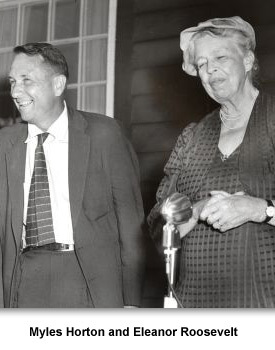
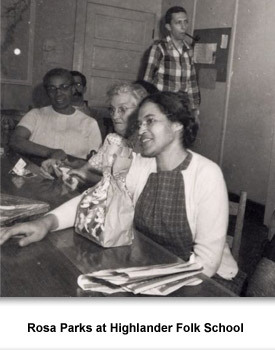
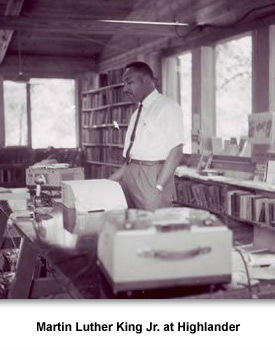
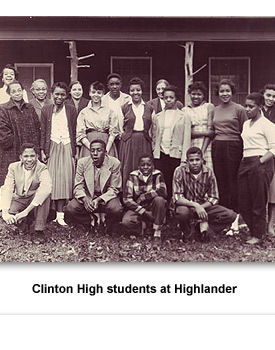
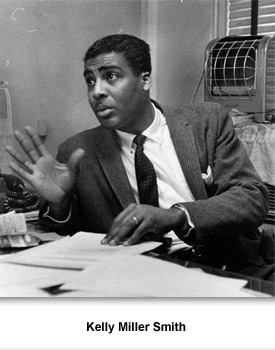
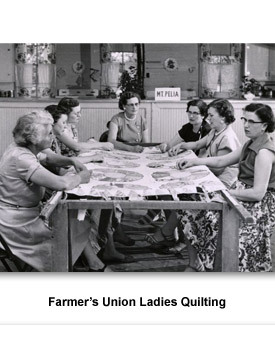
 Sponsored by: National Endowment for the Humanities
Sponsored by: National Endowment for the Humanities